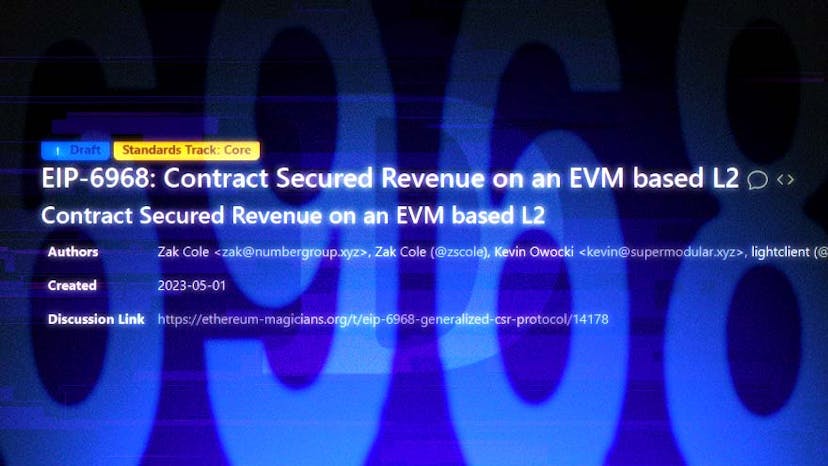Proposed Ethereum Upgrade Could Allow Layer 2 Developers To Share Fee Revenue
EIP-6968 Would Introduce ‘Contract Secured Revenue,’ Allowing DApps To Earn A Share Of Transaction Fees Generated By Their Users
By: Samuel Haig • Loading...
DeFi
Ethereum developers are proposing an upgrade that would let popular dApps earn a share of the transaction fees they generate on Layer 2.
EIP-6968 proposes a new type of token providing “contract secured revenue” (CSR), allowing developers to claim a percentage of the transaction fees generated by users interacting with their smart contracts.
“With CSR, now projects can band together, create an L2 around their shared memes/values, [and] share sequencer fee revenue based on who drives the most usage,” tweeted Kevin Owocki, one of the proposal’s co-authors. “If adopted, this would allow smart contract developers who deploy on L2s to access a potentially lucrative revenue stream.”’
New revenues generated could fund dApp development, public goods, or enable incentives for developers to join a network.
While Owocki first outlined EIP-6968 in May, the proposal has gained renewed traction following a presentation by Owocki at the recent EthCC conference in Paris.
Funding Development With Transaction Fees
EIP-6968 seeks to shake up the highly competitive Ethereum scaling sector, with CSR providing a new type of incentive for developers.
While Layer 2 rollups are presently the leading scaling solution, top L2 teams including Arbitrum, Polygon, and zkSync are already investing resources into building infrastructure for Layer 3 networks.
L3s typically comprise “app-chains” that host a single dedicated decentralized application. Owocki described EIP-6968 as enabling “ecosystem-chains,” described as a step forward from app-chains.
The proposed upgrade is a modified version of EIP-1559, which went live in August 2021 and introduced Ethereum’s burn mechanism. The authors note that EIP-6968 could be used by any network using EIP-1559.
“Using protocol rewards of an L1 to fund smart contract development would be a big change to the way the current market works,” the proposal reads.
“I’m excited to see what kind of traction this creates within the L2 ecosystem, and envision a virtuous flywheel where we see smart contract developers receive revenue for the value they bring to L2s,” Owocki wrote on the Ethereum Magicians forum.
Advertisement
The Defiant Daily
“an industry must-read”
Get an edge in Crypto with our free daily newsletter
Know what matters in Crypto and Web3 with The Defiant Daily newsletter, Mon to Fri
90k+ Defiers informed every day. Unsubscribe anytime.





